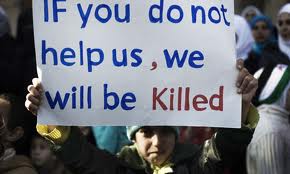 As the death toll grows in Syria, so do the desperate pleas for help.
As the death toll grows in Syria, so do the desperate pleas for help.
“What is the world waiting for?” asked one Syrian woman this week while holed up in a makeshift bomb shelter with her sick son. “For us to die of hunger and fear?”
The United States, the European Union, the Arab League and Turkey are all enforcing sanctions against Bashar al-Assad’s Syrian regime, but the violence has only worsened in recent weeks. Government forces have pounded Homs and other anti-Assad strongholds, devastating homes and leaving many people dead or wounded.
That has only intensified the fierce debate over whether the international community should be doing more to stop the bloodshed. Many have mentioned arming the opposition or providing the same kind of air support that was given to Libyan rebels last year.
But there is a hesitancy right now to intervene militarily, and here are some of the major reasons why:
There is no international consensus.
This is the most obvious hurdle. Last year, the U.N. Security Council voted to impose a no-fly zone in Libya and use “all necessary measures” to protect its people from Moammar Gadhafi.
But the council is not unified on Syria. China and Russia, two Syrian allies, vetoed a resolution earlier this month that would have condemned the Syrian regime and provided legitimacy for a Libya-like intervention if necessary.
“The Chinese and Russians are dead set against (intervention),” said CNN’s Fareed Zakaria in a recent blog post. “So it couldn’t happen through the United Nations. There would be effectively a kind of unilateral or NATO operation with no international legitimacy.”
Nobody seems to want to go it alone on this one, at least not yet. But the idea isn’t without its supporters. A group of prominent U.S. conservatives, for example, recently called for the Obama administration to “take immediate action” despite the vetoes.
That could be the worst possible thing to do, according to Rami Khouri, who runs the international affairs program at the American University in Beirut.
“I think foreign military intervention would probably be catastrophic, and to hear Americans suggest this is to think back what they did in Iraq and what an extraordinary catastrophe that has been,” Khouri said on “Fareed Zakaria GPS.”
We don’t know the opposition well enough.
Many questions still surround the Syrian opposition. Who’s in charge? Are they unified? Are they strong enough to mount a serious challenge to al-Assad’s regime? Can they be trusted?
CNN

Leave a Reply
You must be logged in to post a comment.